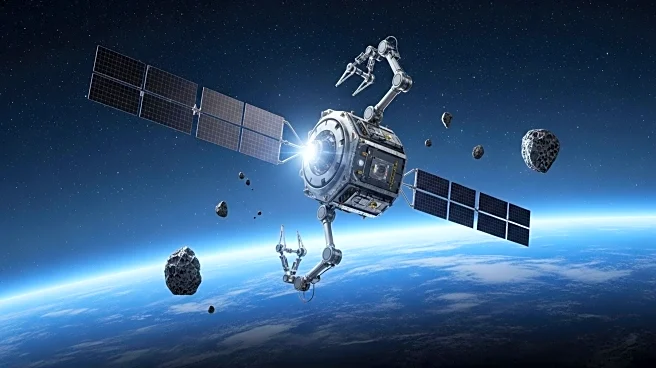What is the story about?
What's Happening?
China is actively developing capabilities to remove space debris from orbit, as confirmed by Bian Zhigang, vice administrator of the China National Space Administration (CNSA). This initiative is part of China's broader efforts to enhance space situational awareness and sustainability, amid its rapidly expanding space activities. The country has an operational space station in low Earth orbit and plans for multiple satellite constellations. The Shijian-21 satellite, launched in 2021, is part of these efforts, conducting rendezvous and proximity operations in space. However, the dual-use nature of active debris removal technology, which can serve both civilian and military purposes, has sparked concerns. The ability to remove defunct satellites could potentially be used to target adversary spacecraft, raising questions about China's intentions.
Why It's Important?
The development of space debris removal technology by China is significant for several reasons. Firstly, it addresses the growing issue of space debris, which poses a threat to the sustainability of space operations. As one of the most active countries in terms of satellite launches, China's efforts could contribute positively to reducing orbital congestion. However, the military implications of such technology cannot be ignored. The dual-use nature of debris removal capabilities means they could be repurposed for military objectives, potentially destabilizing international space relations. This development could lead to increased scrutiny and calls for transparency from the international community, as stakeholders seek to ensure that space remains a domain for peaceful use.
What's Next?
Future policy documents from the CNSA may provide further insights into China's plans and intentions regarding space debris removal. The international community will likely monitor these developments closely, seeking transparency and collaboration. China's actions in this area could influence global space policy, prompting discussions on the regulation of dual-use technologies in space. Additionally, other countries may accelerate their own debris removal initiatives, either independently or through international partnerships, to ensure a balanced approach to space sustainability.
Beyond the Headlines
The ethical and legal dimensions of space debris removal are complex. The potential for military use of such technology raises questions about the need for international agreements to govern its application. As space becomes increasingly commercialized, the role of private companies in debris removal efforts will also be a topic of interest. The balance between national security and international cooperation will be crucial in shaping the future of space governance.















